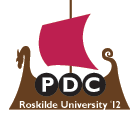| PAPERS | THURSDAY 09:30-10:30 | GRAND AUDITORIUM |
New Perspectives
Session chair: Ann Light, Northumbria University
Early experiences with participation in persuasive technology design
Janet Davis, Grinnell College
Abstract. Persuasive technology, designed to change behaviors and attitudes, stands on uneasy moral ground. A key concern is the appropriateness of the means of persuasion and the intent to persuade. Engaging with those who will use the persuasive technology can ensure that it aligns with their own desires for change. This paper presents an early case study applying participatory design methods to persuasive technology in the context of a college EcoHouse. After presenting the methods and results, I synthesize lessons learned for the intersection of participatory design and persuasive technology design: begin with participants who want change, attend to power relations, promote reflection, start with simple behaviors, use examples to educate and inspire, explore designs in parallel, and be open to not designing technology. Finally, I identify challenges for future work: designing an effective design process, negotiating tensions between effectiveness and reflectiveness, and evaluating the impact of participation.
Hackademia: Building functional rather than accredited engineers
Beth Kolko, Univerisity of Washington
Alexis Hope, University of Washington
Brook Sattler, University of Washington
Kate MacCorkle, University of Washington
Behzod Sirjani, University of Washington
Abstract. Hackademia is a semi-formal learning group that introduces largely non-technical students to basic technical skills by presenting them with open-ended challenges in a peer-based, collaborative environment. This project has two main goals: the near-end goal has been to use a collaborative design model to develop a working, scalable model for teaching engineering literacies in higher education, and the long-term goal is to create participatory opportunities for end-users to develop innovative technologies. This paper describes progress towards the short-term goal, and lessons learned from two years of work to develop a semi-structured educational experience influenced by participant desires. Hackademia leverages a participant-observer research model and participatory research methods such as auto-ethnographies, experience blogging, and semi-structured focus groups.
